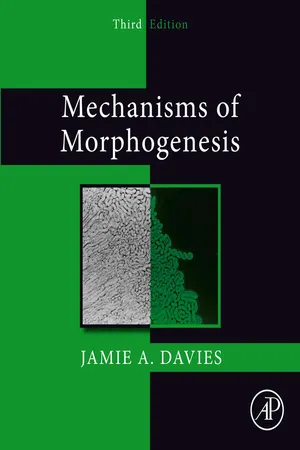
- 532 pages
- English
- ePUB (mobile friendly)
- Available on iOS & Android
eBook - ePub
Mechanisms of Morphogenesis
About this book
Mechanisms of Morphogenesis, Third Edition offers a bottom-up discussion of mechanisms of cell and tissue morphogenesis in a diverse array of organisms, including prokaryotes, animals, plants and fungi. Across foundational, applied and methods-based chapters, this book examines molecular nano-machines cooperation, generate cell shape, direct cell migration, and shape, form and rates of growth of various tissues in the body. Each topic is illustrated with experimental data from real systems, with particular reference to gaps in current knowledge and likely future developments, along with strategies to apply basic morphogenesis science across ever evolving applications.
Newly added chapters feature case-study-driven discussions of morphogenesis in natural embryos and organoids, and illustrate how pathological morphogenesis can generate variants of body form. This edition has also been updated with analysis of large-scale and scale-invariant mechanisms, for example, morphogenesis by differential growth in mechanically connected tissues.
- Includes over 200 full color figures and charts
- Offers an integrated view of theoretical developmental biology and computer modeling with laboratory-based discoveries
- Includes applied, case-study-driven discussion of experimental techniques
- Is organized around principles and mechanisms, using them to integrate discoveries from a range of organisms and systems across new applications
- Covers recent developments in morphogenesis research, including morphogenesis in organoids, other engineered tissues, and an analysis of large-scale and scale-invariant mechanisms
Frequently asked questions
Yes, you can cancel anytime from the Subscription tab in your account settings on the Perlego website. Your subscription will stay active until the end of your current billing period. Learn how to cancel your subscription.
At the moment all of our mobile-responsive ePub books are available to download via the app. Most of our PDFs are also available to download and we're working on making the final remaining ones downloadable now. Learn more here.
Perlego offers two plans: Essential and Complete
- Essential is ideal for learners and professionals who enjoy exploring a wide range of subjects. Access the Essential Library with 800,000+ trusted titles and best-sellers across business, personal growth, and the humanities. Includes unlimited reading time and Standard Read Aloud voice.
- Complete: Perfect for advanced learners and researchers needing full, unrestricted access. Unlock 1.4M+ books across hundreds of subjects, including academic and specialized titles. The Complete Plan also includes advanced features like Premium Read Aloud and Research Assistant.
We are an online textbook subscription service, where you can get access to an entire online library for less than the price of a single book per month. With over 1 million books across 1000+ topics, we’ve got you covered! Learn more here.
Look out for the read-aloud symbol on your next book to see if you can listen to it. The read-aloud tool reads text aloud for you, highlighting the text as it is being read. You can pause it, speed it up and slow it down. Learn more here.
Yes! You can use the Perlego app on both iOS or Android devices to read anytime, anywhere — even offline. Perfect for commutes or when you’re on the go.
Please note we cannot support devices running on iOS 13 and Android 7 or earlier. Learn more about using the app.
Please note we cannot support devices running on iOS 13 and Android 7 or earlier. Learn more about using the app.
Yes, you can access Mechanisms of Morphogenesis by Jamie A. Davies in PDF and/or ePUB format, as well as other popular books in Sciences biologiques & Biologie. We have over one million books available in our catalogue for you to explore.
Information
Table of contents
- Cover
- Front Matter
- Table of Contents
- Copyright
- Dedication
- Preface to Third Edition
- A Note on References
- List of Illustrations
- List of Tables
- Chapter 1 : INTRODUCTION—THE AIMS AND STRUCTURE OF THIS BOOK
- Chapter 2 : KEY PRINCIPLES OF MORPHOGENESIS
- Chapter 3 : The Power and Limitations of Macro-Molecular Self-Assembly
- Chapter 4 : Morphogenesis of Individual Cells: A Brief Overview
- Chapter 5 : Animal Cell Shape: The Importance of the Cytoskeleton
- Chapter 6 : Cellular Morphogenesis in Plants
- Chapter 7 : Cell Migration in Development: A Brief Overview
- Chapter 8 : The Nano-Machinery of Locomotion
- Chapter 9 : Guidance by Chemotaxis
- Chapter 10 : Guidance by Galvanotaxis
- Chapter 11 : Guidance by Contact
- Chapter 12 : Waypoint Navigation in the Embryo
- Chapter 13 : Cooperative Migration of Mesenchymal Cells
- Chapter 14 : Condensation of Cells
- Chapter 15 : The Epithelial State: A Brief Overview
- Chapter 16 : Neighbour Exchange and Convergent Extension
- Chapter 17 : Epithelial Morphogenesis: Closure of Holes
- Chapter 18 : Invagination and Evagination: The Making and Shaping of Folds and Tubes
- Chapter 19 : Epithelial Fusion
- Chapter 20 : Epithelial Branching
- Chapter 21 : Boundaries to Epithelial Movement
- Chapter 22 : Growth, Proliferation and Death – A Brief Overview
- Chapter 23 : Morphogenesis by Orientated Cell Division
- Chapter 24 : Morphogenesis by Elective Cell Death
- Chapter 25 : From Mechanisms to Morphology: A Brief Overview
- Chapter 26 : Case Studies From Natural Development
- Chapter 27 : Morphogenesis in Organoids
- Chapter 28 : Pathological Morphogenesis
- Chapter 29 : Modelling Morphogenesis: A Brief Overview
- Chapter 30 : Mechanical and Mathematical Models of Morphogenesis
- Chapter 31 : Modelling Using Living Cells: Environment Switching, Tissue Engineering, and Synthetic Morphology
- Chapter 32 : Conclusions and Perspectives
- Index
- A